

Google. Educ 403x: Education's Digital Future. Panelists: Brigid Barron (Stanford Graduate School of Education), Nichole Pinkard (DePaul University), Elisabeth Soep MA '95, PhD '00 (Oakland’s Youth Radio) What it means to be "literate" continues to expand as new media and new expressive forms co-evolve in the digital era.
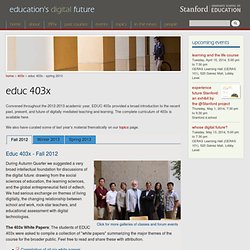
This forum features cutting-edge inquiries in under-resourced public schools and neighborhoods -- in which students work with mentors in creating video, radio, animations, spoken word poetry, and other media that advance 21st-century communication and interpretation skills. The panel will be co-hosted by Stanford Graduate School of Education Professor Paulo Blikstein. Minnesota bans Coursera: State takes bold stand against free education. Screenshot / Coursera UPDATE, Oct. 19, 7:07 p.m.: Common sense has indeed prevailed!

Minnesota has decided to stop enforcing an outdated law that had led to Coursera telling the state's residents they weren't allowed to take its free online classes. For more, see my follow-up post here. Original post: Honorable mentions go to New York City’s Taxi and Limousine Commission for driving out Uber’s online taxi-hailing service and to automobile dealers’ groups in four states for trying to have Tesla dealerships declared illegal. 2U teams with top schools to to show there’s more to online ed than MOOCs. The New York Times might be calling it “the year of the MOOC,” but the future of online learning isn’t just massive online courses.
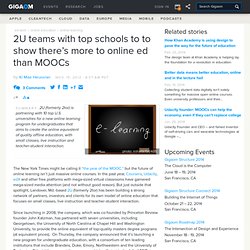
In the past year, Coursera, Udacity, edX and other free platforms with mega-sized virtual classrooms have garnered mega-sized media attention (and not without good reason). But just outside that spotlight, Landover, Md. -based 2U (formerly 2tor) has been building a strong network of partners, investors and clients for its own model of online education that focuses on small classes, live instruction and teacher-student interaction.
Since launching in 2008, the company, which was co-founded by Princeton Review founder John Katzman, has partnered with seven universities, including Georgetown, the University of North Carolina at Chapel Hill and Washington University, to provide the online equivalent of top-quality masters degree programs (at equivalent prices). Students get flexibility, expanded options Higher ed beginning to accept digital. 29 New Schools, 92 New Courses, 5 Languages, 4 Continents and 2.7 Million Courserians. Coursera adds first international university partners, raises additional $6M. Online education startup Coursera isn’t just revolutionizing learning in the U.S., it’s refashioning higher education for people around the world.
Since its earliest courses, Coursera’s student population has been highly international (it’s currently 35 percent domestic, 65 percent international). And, in addition to announcing $6 million in new funding, the startup Tuesday said that it’s adding its first international university partners. Daphne Koller: What we're learning from online education. Teaching to the World From Central New Jersey - Commentary. Massive online education: Daphne Koller at TEDGlobal 2012. Schools out of reach.
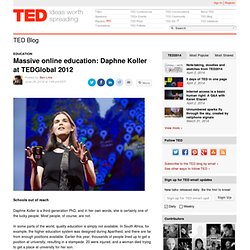
Teaching a MOOC: Lessons Learned & Best Balch Practices « the augmented trader. I just completed teaching a MOOC on Computational Investing via coursera.org.
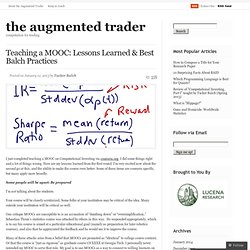
I did some things right and a lot of things wrong. Here are my lessons learned from the first round. I’m very excited now about the second go at this, and the ability to make the course even better. Some of these items are coursera specific, but many apply more broadly. Welcome to MRUniversity. EdX explores demographics of most persistent MOOC students. As the MOOC buzz continues to reverberate across higher education, the question of which subjects and populations these massive open online courses are best-suited to remains a mystery.
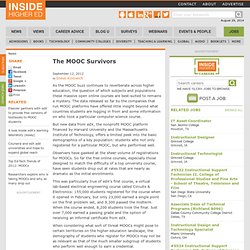
The data released so far by the companies that run MOOC platforms have offered little insight beyond what countries students are logging in from and some information on who took a particular computer science course. But new data from edX, the nonprofit MOOC platform financed by Harvard University and the Massachusetts Institute of Technology, offers a limited peek into the basic demographics of a key population: students who not only registered for a particular MOOC, but who performed well. A First for Udacity: Transfer Credit at a U.S. University for One of Its Courses - Technology. By Katherine Mangan A Colorado university is announcing on Thursday that it will give full transfer credit to students who complete a free introductory computer-science course offered by the online-education start-up company Udacity.

The announcement, by Colorado State University-Global Campus, is a milestone for the Stanford University spinoff. This is the first time a university in the United States has offered academic credit for a Udacity course, although several universities in Austria and Germany already do. The course, "Introduction to Computer Science: Building a Search Engine," teaches basic computer-science skills by having students build a Web search engine similar to Google. Students enrolled in the free, online course also learn the basics of the programming language Python. Step Forward For New Higher Education Model. MOOC pedagogy: the challenges of developing for Coursera. In the summer of 2012 the team of teachers and researchers associated with the MSc in E-learning programme at the University of Edinburgh began developing a Massive Open Online Course (MOOC) for the Coursera platform.
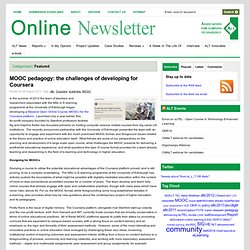
Launched only a year earlier, this for-profit company founded by Stanford professors Andrew Ng and Daphne Koller has focussed primarily on hosting computer science related courses from big name US institutions. The recently announced partnership with the University of Edinburgh presented the team with an opportunity to engage and experiment with the much-publicised MOOC format, and foreground issues related to the theory and practice of online education itself. Designing for MOOCs Devising a course to utilise the potential educational advantages of the Coursera platform proved, and is still proving, to be a complex undertaking.
Firstly there is the issue of digital mimicry.